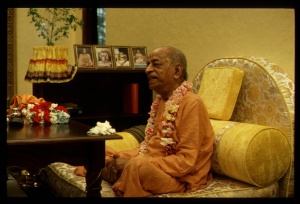CC Antya 14.16 (1975): Difference between revisions
(Vanibot #0027: CCMirror - Mirror CC's 1996 edition to form a basis for 1975) |
(Vanibot #0020: VersionCompareLinker - added a link to the Version Compare feature) |
||
| Line 2: | Line 2: | ||
<div style="float:left">'''[[Sri Caitanya-caritamrta (1975)|Śrī Caitanya-caritāmṛta (1975)]] - [[CC Antya (1975)|Antya-līlā]] - [[CC Antya 14 (1975)|Chapter 14: Lord Śrī Caitanya Mahāprabhu's Feelings of Separation from Kṛṣṇa]]'''</div> | <div style="float:left">'''[[Sri Caitanya-caritamrta (1975)|Śrī Caitanya-caritāmṛta (1975)]] - [[CC Antya (1975)|Antya-līlā]] - [[CC Antya 14 (1975)|Chapter 14: Lord Śrī Caitanya Mahāprabhu's Feelings of Separation from Kṛṣṇa]]'''</div> | ||
<div style="float:right">[[File:Go-previous.png|link=CC Antya 14.15 (1975)|Antya-līlā 14.15]] '''[[CC Antya 14.15 (1975)|Antya-līlā 14.15]] - [[CC Antya 14.17 (1975)|Antya-līlā 14.17]]''' [[File:Go-next.png|link=CC Antya 14.17 (1975)|Antya-līlā 14.17]]</div> | <div style="float:right">[[File:Go-previous.png|link=CC Antya 14.15 (1975)|Antya-līlā 14.15]] '''[[CC Antya 14.15 (1975)|Antya-līlā 14.15]] - [[CC Antya 14.17 (1975)|Antya-līlā 14.17]]''' [[File:Go-next.png|link=CC Antya 14.17 (1975)|Antya-līlā 14.17]]</div> | ||
{{CompareVersions|CC|Antya 14.16|CC 1975|CC 1996}} | |||
{{RandomImage}} | {{RandomImage}} | ||
==== TEXT 16 ==== | ==== TEXT 16 ==== | ||
| Line 11: | Line 10: | ||
<div class="verse"> | <div class="verse"> | ||
:etasya mohanākhyasya | :etasya mohanākhyasya | ||
:gatiṁ | :gatiṁ kāmapy upeyuṣaḥ | ||
:bhramābhā kāpi vaicitrī | :bhramābhā kāpi vaicitrī | ||
:divyonmāda itīryate | :divyonmāda itīryate | ||
| Line 22: | Line 21: | ||
<div class="synonyms"> | <div class="synonyms"> | ||
etasya—of this; mohana-ākhyasya—mood known as mohana, or enchanting; gatim—progress; | etasya—of this; mohana-ākhyasya—mood known as mohana, or enchanting; gatim—progress; kāmapi—inexplicable; upeyuṣaḥ—having obtained; bhrama-ābhā—resembling bewilderment; kāpi—some; vaicitrī—condition bringing about astonishment; divya-unmāda—transcendental madness; iti—thus; īryate—it is called; udghūrṇā—of the name udghūrṇā; citra-jalpa—of the name citra-jalpa; ādyāḥ—and so on; tat-bhedāḥ—different features of that; bahavaḥ—many; matāḥ—described. | ||
</div> | </div> | ||
| Line 29: | Line 28: | ||
<div class="translation"> | <div class="translation"> | ||
"When the ecstatic emotion of enchantment gradually progresses, it becomes similar to bewilderment. Then one reaches the stage of astonishment [vaicitrī], which awakens transcendental madness. Udghūrṇā and citra-jalpa are two among the many divisions of transcendental madness." | |||
</div> | </div> | ||
| Line 36: | Line 35: | ||
<div class="purport"> | <div class="purport"> | ||
This is a quotation from the Ujjvala-nīlamaṇi ( | This is a quotation from the Ujjvala-nīlamaṇi (Sthāyibhāva-prakaraṇa 190). | ||
</div> | </div> | ||
Latest revision as of 22:15, 26 January 2020

A.C. Bhaktivedanta Swami Prabhupada
TEXT 16
- etasya mohanākhyasya
- gatiṁ kāmapy upeyuṣaḥ
- bhramābhā kāpi vaicitrī
- divyonmāda itīryate
- udghūrṇā-citra-jalpādyās
- tad-bhedā bahavo matāḥ
SYNONYMS
etasya—of this; mohana-ākhyasya—mood known as mohana, or enchanting; gatim—progress; kāmapi—inexplicable; upeyuṣaḥ—having obtained; bhrama-ābhā—resembling bewilderment; kāpi—some; vaicitrī—condition bringing about astonishment; divya-unmāda—transcendental madness; iti—thus; īryate—it is called; udghūrṇā—of the name udghūrṇā; citra-jalpa—of the name citra-jalpa; ādyāḥ—and so on; tat-bhedāḥ—different features of that; bahavaḥ—many; matāḥ—described.
TRANSLATION
"When the ecstatic emotion of enchantment gradually progresses, it becomes similar to bewilderment. Then one reaches the stage of astonishment [vaicitrī], which awakens transcendental madness. Udghūrṇā and citra-jalpa are two among the many divisions of transcendental madness."
PURPORT
This is a quotation from the Ujjvala-nīlamaṇi (Sthāyibhāva-prakaraṇa 190).